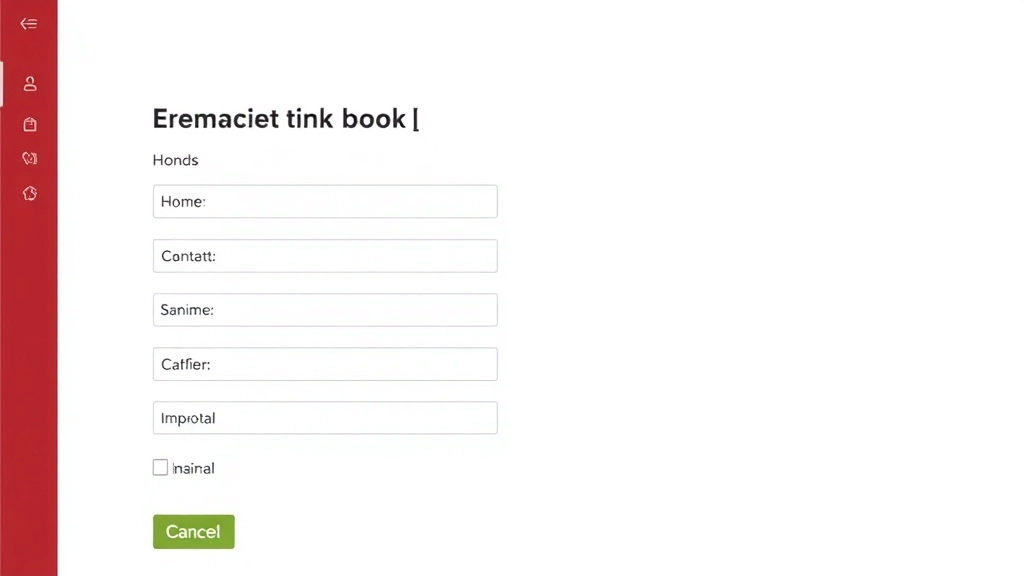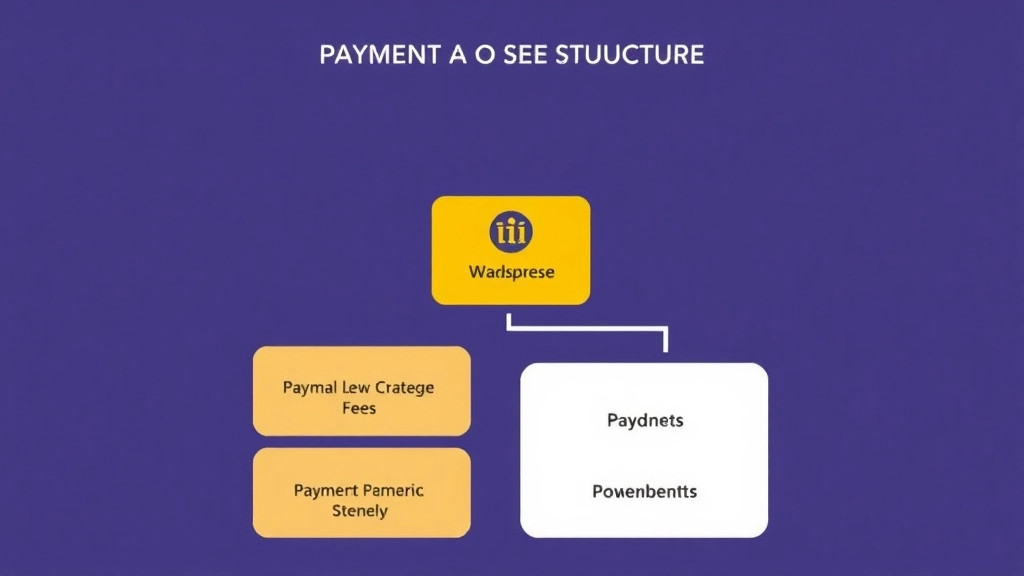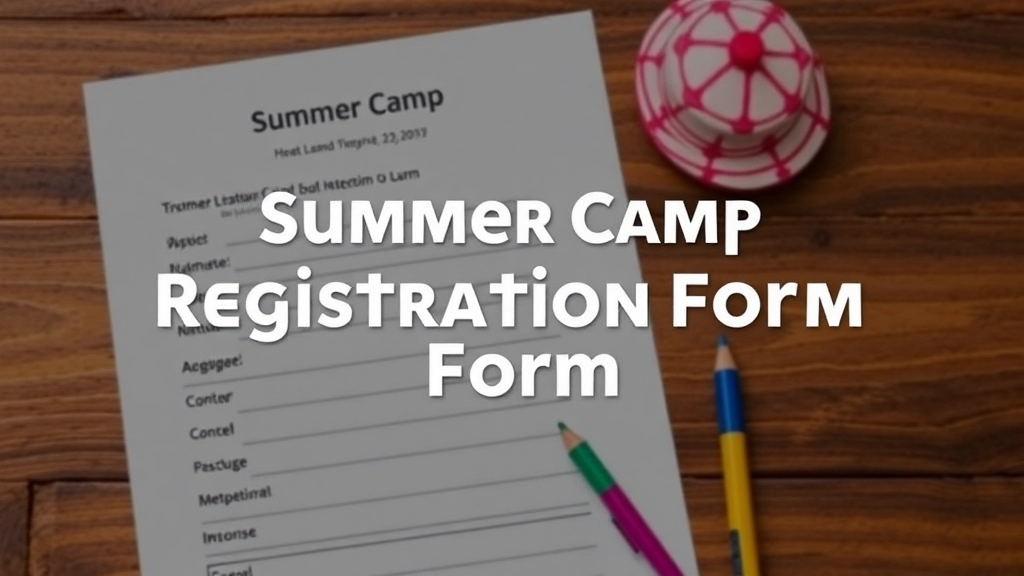Understanding the Summer Camp Registration Form
Enrolling your child in a summer camp can feel like navigating a complex maze, but understanding the summer camp registration form is your first step towards a seamless experience. This article breaks down each section of the form, from personal information and emergency contacts to health details and session selection. We’ll also guide you through the payment structure, terms and conditions, and how to make special requests, ensuring you cover all bases for your child’s safety and enjoyment.
Practical Tips and Real-Life Examples
We know the process can be daunting, so we’ve included practical tips and real-life examples to make it easier. Whether you’re a first-time camp parent or a seasoned pro, our comprehensive guide will help you fill out the summer camp registration form with confidence. By the end of this article, you’ll be well-equipped to provide all the necessary details, avoid common pitfalls, and ensure your child has a memorable and safe camp experience.
Key Components of a Summer Camp Registration Form
So, you’re thinking about sending your kid to summer camp, but the registration form is staring you down like a mountain to climb. What do you really need to know? What should you be looking out for? Let’s break it down.
Why Is the Registration Form So Important?
First off, summer camp registration forms are not just about getting your kid’s name on a list. They’re your chance to ensure everything goes smoothly, from knowing who to contact in an emergency to making sure your child gets into the right activities. It’s all about creating the perfect summer experience.
What Are the Key Sections?
Here’s what you’ll typically find in a summer camp registration form:
- Personal Information: This is the basicsâname, age, contact details. Simple, but crucial.
- Emergency Contact Details: You need someone who can step in if you’re not available. Think of it as a safety net.
- Health and Medical Information: Allergies? Medications? This is where you spill the beans on anything the camp needs to know to keep your child safe.
- Camp Session Selection: Picking the right session is like choosing the best ice cream flavourâget it right, and your kid will have a blast.
- Payment and Fees Structure: Nobody likes surprises here. Know what you’re paying for and when.
- Terms and Conditions Agreement: Yes, it’s the fine print, but it’s important. It’s all about understanding the camp’s rules and policies.
- Special Requests and Accommodations: Got any specific needs or requests? This is your chance to speak up.
- Submission and Confirmation Process: How do you know your spot is secured? This section will tell you what to expect.
Real Concerns, Real Solutions
You might be worried about missing a detail or not understanding a section. Here’s a quick checklist to keep things straightforward:
- Double-check contact info: Make sure everything’s up to date.
- Health details: Be thorough. Better safe than sorry.
- Session choices: Align them with your child’s interests.
- Understand the fees: No hidden costs should catch you off guard.
A Quick Story
I remember when I filled out my kid’s first camp form. I missed the emergency contact section. Rookie mistake, right? But it taught me to always double-check everything. Now I’m sharing this over coffee with you so you don’t make the same mistake.
If you’re still unsure about the costs involved, check out our detailed guide on summer camp costs to get a clear picture. And if you’re looking for ways to save, our article on summer camp scholarships might be just what you need.
Personal Information Section

Alright, let’s dive into the Personal Information Section of the summer camp registration form.
Ever wondered why camps need so much info about your kid?
It’s not just about knowing their name.
They need to ensure your child’s safety, tailor activities to their needs, and keep you in the loop.
Here’s what you’ll typically need to fill out:
Basic Details
- Full Name: No nicknames here. They need the official stuff.
- Date of Birth: Camps often group kids by age.
- Gender: Helps in planning accommodations and activities.
Contact Information
- Home Address: In case they need to send you something.
- Phone Number: Your digits, not your kid’s. They’ll call you if anything’s up.
- Email Address: For updates, newsletters, and important info.
Parent/Guardian Info
- Name: Your name, obviously.
- Relationship to Camper: Mum, Dad, Guardian, etc.
- Additional Contact: A second person they can reach out to if needed.
Stories Over Coffee
Imagine this: Your kid’s at camp, having the time of their life, but suddenly they feel a bit under the weather.
The camp needs to reach you ASAP.
Having all your contact info in one place ensures they can get in touch quickly.
Why All This Info?
- Safety First: They need to know who to call in an emergency.
- Personalised Experience: Knowing your child’s details helps them plan better activities.
- Smooth Communication: No one wants to miss out on important updates.
Quick Tips for Filling Out This Section
- Double-Check Everything: Typos can mess things up.
- Be Honest: Accurate info helps the camp staff take better care of your kid.
- Keep It Current: Update your contact details if they change.
And there you have it.
The Personal Information Section might seem straightforward, but it’s crucial for a smooth camp experience.
Emergency Contact Details
Alright, let’s dive into the nitty-gritty of Emergency Contact Details. This section might seem straightforward, but it’s absolutely crucial for your child’s safety and your peace of mind. Let’s face it, the thought of an emergency at summer camp can be nerve-wracking. So, let’s make sure we’re covering all bases here.
Why Emergency Contact Details Matter
First off, why are emergency contact details so important? Well, imagine this: your kid’s having the time of their life at camp, but then they twist an ankle or feel under the weather. The camp staff needs to get in touch with you or someone you trust ASAP. This isn’t just a formalityâit’s a lifeline.
What You Need to Include
When filling out this section, make sure you provide:
- Primary Contact: Usually, this is you, the parent or guardian. Include your full name, relationship to the child, and all relevant phone numbers (mobile, work, home).
- Secondary Contact: This should be someone reliable, like a family member or close friend. Again, full name, relationship to the child, and phone numbers are essential.
- Additional Contacts: Some camps might ask for a third contact. Better safe than sorry, right?
Double-Check for Accuracy
Don’t just scribble down numbers and call it a day. Double-check everything. Imagine the camp staff trying to reach you, but they can’t because of a typo. Yeah, not cool.
Real-Life Example
Let me share a quick story. A friend of mine once had to rush to a camp because the staff couldn’t reach her due to a wrong digit in the phone number. She was two hours away! Lesson learned: triple-check those digits.
Pro Tips for Parents
- List Local Contacts: If you’re going to be out of town, list someone local who can get to the camp quickly.
- Update Regularly: If your contact info changes, inform the camp immediately. Don’t wait until the last minute.
- Emergency Plan: Have a quick chat with your emergency contacts. Make sure they know they’re listed and understand the camp’s location and procedures.
For more tips on ensuring a smooth camp experience, check out our Charter Bus Tips for a Perfect Summer Camp Trip and explore some Fun Summer Camp Crafts for Kids to keep the excitement going!
Health and Medical Information

Alright, let’s dive into the nitty-gritty of the summer camp registration form: Health and Medical Information.
This section is crucial.
Why?
Because we need to know everything to keep your child safe and sound.
What Does This Section Cover?
Health History:
- Any past illnesses or surgeries?
- Any chronic conditions like asthma or diabetes?
Allergies:
- Is your child allergic to nuts, bee stings, or anything else?
Medications:
- Is your child on any medication?
- How often do they need to take it?
Doctor’s Information:
- Name and contact of your child’s doctor.
- Any specific instructions or medical protocols?
Why Is This Important?
You don’t want any surprises.
Imagine your child has an allergic reaction, and we have no idea what’s going on.
That’s a nightmare scenario.
We need to be prepared.
Real Concerns
You might be thinking:
- “What if my child needs an inhaler?”
- “What if they have a severe allergy?”
Don’t worry.
We’ve got a system in place.
How to Fill This Out?
Be Thorough:
- Don’t skip any details.
- More info helps us help your child better.
Be Honest:
- This isn’t the time to downplay anything.
- If your child needs something, say it.
Be Proactive:
- If there are updates, let us know ASAP.
Example
Let’s say your child has asthma.
- Write down the triggers.
- Note the medication they need.
- Explain what to do in case of an attack.
This way, we’re all on the same page.
Final Thoughts
Health and Medical Information is not just a formality.
It’s about ensuring your child has the best, safest experience possible.
So, take your time with this section.
It’s worth it.
Got questions?
Reach out to us.
We’re here to help.
Camp Session Selection
Alright, let’s dive into the nitty-gritty of choosing the perfect camp session for your kid. I know, it can feel like you’re trying to solve a Rubik’s Cube blindfolded. But don’t worry, I’ve got your back.
Why is Camp Session Selection Important?
First off, the camp session selection isn’t just about picking dates. It’s about finding the right fit for your child’s interests, schedule, and comfort level. You want them to have a blast, make friends, and maybe even learn a thing or two. So, let’s break it down.
Common Questions Parents Have
- “What if the session dates don’t align with our family’s summer plans?”
- “How do I know which session is best for my child’s age and interests?”
- “What if my child wants to attend multiple sessions?”
Step-by-Step Guide to Selecting the Right Camp Session
- Check the Calendar: Start by looking at your family’s summer schedule. Match the camp dates with your availability. You don’t want to double-book your kid’s summer with other activities.
- Understand the Themes: Many camps offer themed sessionsâlike sports, arts, or nature. Chat with your child about what excites them. This isn’t just about keeping them busy; it’s about engaging their passions. For creative theme ideas, check out Creative Summer Camp Themes.
- Age Groups and Skill Levels: Make sure the session you’re eyeing is appropriate for your child’s age and skill level. Camps usually have different sessions for various age brackets and abilities.
- Duration Matters: Some kids are ready for a two-week adventure, while others might prefer a shorter stint. Consider your child’s comfort level with being away from home. Learn more about finding the perfect duration here.
- Multiple Sessions: If your child is gung-ho about camp, see if they can attend more than one session. Some camps even offer discounts for multiple bookings.
Real-Life Example
Last summer, my neighbour’s kid, Timmy, was all about soccer. They picked a sports-themed session that ran for two weeks. He came back not only with improved skills but a bunch of new friends and stories. Meanwhile, his younger sister chose a nature-themed session that was just one week longâperfect for her first camp experience. Both kids had a blast because their parents took the time to match the camp sessions to their interests and readiness.
Payment and Fees Structure

Ever looked at a summer camp registration and thought, “How much is this really going to cost me?”
You’re not alone.
Let’s break it down.
Understanding the Fees
First off, what are you paying for?
- Camp tuition: This covers the basics—activities, meals, and accommodation.
- Additional activities: Some camps offer extra stuff like horseback riding or rock climbing. These might come with extra fees.
- Materials or equipment: If your kid’s doing something specialised, there might be a charge for gear.
Payment Options
Worried about how to pay?
Here’s the scoop:
- One-time payment: Pay it all upfront. Simple, done, dusted.
- Installments: Spread the cost over a few months. Easier on the wallet.
- Early bird discounts: Sign up early and save some cash.
Refund Policy
Life happens, right?
Check the refund policy:
- Full refunds: Usually available if you cancel within a certain timeframe.
- Partial refunds: If you cancel closer to the start date.
- No refunds: Sometimes, it’s just too late.
Hidden Costs
No one likes surprises.
Look out for:
- Transport fees: Is getting to camp included?
- Uniforms or specific clothing: Sometimes required, sometimes not.
- Insurance: Optional but can be a lifesaver.
Real Talk
I remember when I first signed my kid up for camp.
I was overwhelmed by all the options.
But breaking it down like this made it manageable.
And that’s what you need—a clear view of the payment and fees structure.
So, take a deep breath.
You’ve got this.
And remember, understanding the fees structure is key to avoiding any unexpected surprises.
Terms and Conditions Agreement
Alright, let’s get real about the Terms and Conditions Agreement. I know, just hearing those words can make your eyes glaze over. But stick with me, because this stuff is crucial. When you’re registering your kid for summer camp, you’re not just signing them up for a few weeks of fun; you’re entering into a legal contract. So, it’s important to understand what you’re agreeing to.
Why You Should Care About Terms and Conditions
Ever wondered what happens if your kid gets sick at camp? Or what if you need to cancel last minute? These are the kinds of questions that the terms and conditions are designed to answer. Here are some key points you’ll typically find in this section:
- Cancellation Policy: What happens if you need to back out? Some camps offer refunds, others might give you a credit for next year, and some might not offer anything at all.
- Behaviour Guidelines: What’s expected of your child in terms of behaviour? This could include rules about respecting others, participating in activities, and adhering to camp schedules.
- Liability Waiver: This is where you acknowledge the risks involved in camp activities and agree not to hold the camp responsible for injuries or accidents.
- Photo and Media Release: Camps often take photos and videos for promotional purposes. By signing, you might be giving them permission to use your child’s image.
- Medical Treatment Consent: In case of an emergency, camps need your consent to provide medical treatment to your child.
Breaking Down the Legal Jargon
Let’s be honest, legal language can be a bit of a maze. But it doesn’t have to be. Here’s a quick breakdown of some common terms you might encounter:
- Indemnity: This means you agree to protect the camp from any legal issues that might arise from your child’s participation.
- Force Majeure: This is a fancy way of saying that if something really unexpected happens (like a natural disaster), the camp isn’t responsible for cancellations or changes.
- Jurisdiction: This tells you which state’s laws will apply if there’s a dispute.
Real-Life Example
Imagine this: Your kid is all set for camp, but a week before it starts, they break an arm. You check the terms and conditions and see that the camp has a strict no-refund policy for cancellations within two weeks of the start date. Because you read the fine print, you know exactly what to expect and can plan accordingly.
Action Steps for Parents
- Read Every Word: It might be tempting to skim, but take the time to read through the entire agreement.
- Ask Questions: If something isn’t clear, don’t hesitate to reach out to the camp for clarification.
- Keep a Copy: Always keep a copy of the signed agreement for your records.
Special Requests and Accommodations

Got a kid with unique needs? You’re not alone. We get it. Every child is different, and we want to make sure your kid has the best summer camp experience possible.
Why This Matters
Ever worried your child won’t fit in or get the care they need? You’re not alone. Many parents share the same concern. That’s why we’ve got a section just for special requests and accommodations.
What to Include
Here’s what you should jot down:
- Dietary Restrictions: Is your child allergic to peanuts? Vegan? Gluten-free? Let us know.
- Medical Needs: Asthma inhalers, EpiPens, daily meds—whatever it is, we need the deets.
- Behavioural Needs: Does your child need a bit more structure? Maybe a buddy system? Share it.
- Physical Accommodations: Wheelchair access, special seating, etc. We’re here for it.
How We Handle It
Worried we’ll miss something? Don’t be. We’ve got a system to make sure every request gets the attention it deserves. We review each form meticulously. Then, we tailor our approach to each child’s needs.
Real Talk
Let’s be real. No one wants their kid to feel left out or uncomfortable. By filling out this section, you’re helping us make sure your child has a blast.
Contact Us
Still got questions? We’re here to help. Just give us a shout, and we’ll walk you through it.
Submission and Confirmation Process
Alright, so you’ve filled out every section of the summer camp registration form. Now what? You might be wondering, “What’s the next step?” or “How do I make sure everything’s in order?” Let’s break it down, step-by-step, so you can hit that âSubmit’ button with confidence.
Double-Check Everything
Before you even think about submitting the form, do a quick review. Trust me, it’s worth the extra five minutes. Here’s a checklist to make sure you didn’t miss anything:
- Personal Information: Is your child’s name spelled correctly? Did you enter the right date of birth?
- Emergency Contacts: Are the phone numbers correct and easy to reach?
- Health Info: Did you specify any allergies or medical conditions?
- Camp Session: Did you select the correct dates and times?
- Payment Details: Is your payment info accurate?
Hit Submit
Once you’re sure everything’s accurate, it’s time to hit that âSubmit’ button. This part can feel a bit nerve-wracking, but don’t worry. Most online forms will give you a confirmation screen or email after you submit. Look out for:
- Confirmation Message: A message on the screen that says your form has been successfully submitted.
- Confirmation Email: An email that usually lands in your inbox within a few minutes. This email often contains important details like a summary of your registration and a receipt if you’ve made a payment.
What If You Don’t Get a Confirmation?
So, you’ve clicked submit, but there’s no confirmation email. Now what? Don’t panic. Here’s what you can do:
- Check Spam/Junk Folder: Sometimes, emails end up there.
- Wait a Bit: Give it a few hours. Sometimes there’s a delay.
- Contact Support: If you still haven’t received anything, reach out to the camp’s support team. Most camps have a phone number or email address for registration issues.
Follow-Up
After submitting and receiving confirmation, keep an eye out for any follow-up communications from the camp. These might include:
- Welcome Packets: Information about what to pack, camp rules, and schedules.
- Medical Forms: Additional forms that might need to be signed by a doctor.
- Payment Reminders: If you opted for a payment plan, you might get reminders for upcoming payments.
Real Talk: Common Worries
I get it, you’re probably still thinking, “What if I messed something up?” or “What if I need to change something later?” Here’s the deal:
- Mistakes Happen: Camps understand that errors can occur. Most will allow you to make corrections. Just get in touch with them ASAP.
- Changes: If you need to change session dates or update health information, contact the camp directly. They’re usually pretty accommodating.
For more tips on getting your child ready for camp, check out our Summer Camp Packing List and our guide on Summer Camp Activities to ensure a smooth and enjoyable experience.
Tips for Parents Filling Out the Form
Summer camp registration forms can be a bit daunting, right?
But don’t worry, I’ve got your back.
Let’s break it down step-by-step.
Get Your Ducks in a Row
Before diving in, gather all the necessary info:
- Personal details (name, address, etc.)
- Emergency contacts (best to have more than one)
- Health and medical info (allergies, medications, etc.)
- Payment details (credit card, bank info)
Having everything ready makes the process smoother.
Double-Check Personal Information
Mistakes happen.
But a wrong phone number or email can cause major headaches.
So, double-check everything.
Even better, have someone else look it over.
Emergency Contacts are Key
Emergencies happen.
Make sure you list contacts who can be reached easily.
Preferably locals who know your child well.
Be Honest About Health and Medical Info
Got a kid with allergies or special needs?
Be upfront.
Camps need to know this to keep your child safe.
Choose the Right Camp Session
Look at the dates and activities.
Pick a session that fits your schedule and your child’s interests. Check out our summer camp weekly themes for some exciting options.
Understand Payment and Fees
No one likes surprises, especially when it comes to money.
Read the payment terms carefully.
Know what’s refundable and what’s not. For more details, you might want to read Summer Camp Costs: What You Need to Know.
Read the Terms and Conditions
Yeah, it’s boring.
But it’s crucial.
Make sure you understand the rules and policies.
Special Requests and Accommodations
Got any special requests?
Maybe your child needs a specific diet or has a unique requirement.
Mention it clearly.
Hit Submit and Wait for Confirmation
Once you’ve filled everything out, hit that submit button.
Then, keep an eye on your inbox for a confirmation email.
If you don’t get one, follow up.
Quick Tips for a Smooth Process
- Use a checklist: It helps keep track of what you’ve done.
- Take your time: Rushing can lead to mistakes.
- Ask questions: If you’re unsure about something, reach out to the camp.
Real Talk
I once forgot to list my kid’s peanut allergy.
It was a nightmare.
Learn from my mistake.
Double-check and triple-check.
Filling out a summer camp registration form doesn’t have to be stressful.
Just keep it real, stay organised, and you’ll be golden.
FAQs for Summer Camp Registration Form
Why do camps ask for so much personal information about my child?
Camps need detailed personal information to ensure your child’s safety, tailor activities to their needs, and keep you informed. It’s not just about knowing their name; it’s about creating a secure and enjoyable camp experience.
What basic details are required in the Personal Information Section?
You will need to provide your child’s full name, date of birth, and gender. These details help in grouping kids by age and planning accommodations and activities.
Why is contact information necessary?
Contact information, including your home address, phone number, and email address, is essential for sending updates, newsletters, and important info. It ensures the camp can reach you quickly if needed.
What kind of health and medical information is required?
You need to provide details on your child’s health history, allergies, medications, and doctor’s information. This ensures the camp is prepared to handle any medical situations that may arise.
How should I fill out the Health and Medical Information section?
Be thorough and honest. Include all relevant details about past illnesses, chronic conditions, allergies, medications, and specific instructions from your child’s doctor. This information is crucial for your child’s safety.
What does the Payment and Fees Structure cover?
The fees typically cover camp tuition, additional activities, and materials or equipment. It’s important to understand what you’re paying for to avoid any surprises.
Are there different payment options available?
Yes, camps usually offer one-time payment, installments, and early bird discounts. Choose the option that best suits your financial situation.
What is the refund policy for camp fees?
Refund policies vary. Some camps offer full refunds if you cancel within a certain timeframe, partial refunds if you cancel closer to the start date, and no refunds if it’s too late. Always check the specific policy of the camp.
What should I include in the Special Requests and Accommodations section?
Include any dietary restrictions, medical needs, behavioral needs, and physical accommodations your child may require. This helps the camp staff provide the best care and ensure your child’s comfort.
How does the camp handle special requests and accommodations?
The camp reviews each form meticulously and tailors their approach to meet each child’s unique needs. They have a system in place to ensure no detail is overlooked.
What if I have more questions about the registration form?
If you have any additional questions or concerns, don’t hesitate to contact the camp. They are there to help and guide you through the registration process to ensure everything is clear and complete.
References
-
Understanding Summer Camp Registration Forms
-
Summer Camp Health Forms: What Parents Need to Know
-
How to Choose the Best Summer Camp for Your Child

